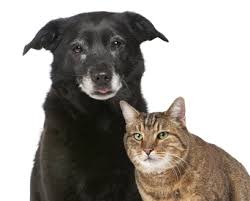Saving Your Pet's Life With
Love!
Dimentia and Animal Alzheimers
Don DeForge, VMD
Animal Doc AM Multi-Media
10Jun2013

One morning you will awake and the dog or cat you love will seem different. You will call and your pet will look at you with a blank face. Your friend will seem lost, confused, and helpless. You will question the increased pacing at night and changes that have occurred in the sleep cycle of your companion. Other family members realize something is wrong. A trip to the local veterinarian, that has treated your pet for a dozen years, is agreed upon and scheduled.
When you reach the doctor, the veterinarian states a battery of tests is needed to separate physical problems from the behavioral changes of aging. A chemistry profile and CBC is run; your pet is examined for infectious disease; endocrine testing for possible diabetes, thyroid, and adrenal disease is completed; x-rays are taken of the chest, abdomen, and orthopedic system. Dental X-rays are recommended to rule out oral pain as a cause of changes in behavior. If all of these tests are normal, your veterinarian might recommend a referral to an internal medicine doctor and/or neurologist for pets. Your LDVM might additionally suggest an MRI of the central nervous system and head. It is always a good idea to accept referral to a specialist about the need for additional testing when a diagnosis of Cognitive Dysfunction is being considered..
There are many names for cognitive dysfunction. Some call it Senior Dimentia; others coin the term Age Related Senility; and some phrase the problem Pet Alzheimers. Here are some of the signs to look for at home in your aged dog/cat that would make a trip to the veterinarian very important:
- Housebreaking habits have stopped; a well trained dog/cat starts to urinate and defecate in the home at night
- Wandering at night; restlessness and pacing
- Panting
- Unable to recognize other pets or people in the home
- Not interested in favorite play toys
- Sleep habits change; a good sleeper only sleeps for short times and then becomes restless
- Pacing at night or during the day without rest
- Disinterest in people visiting; in the past your companion became very excited about visitors
- Not wanting to go on walks and car rides; these were special events in the past
- A decline in memory-i.e.-forgetting tricks that were common to perform; forgetting where food and water bowls have been placed; not knowing where the doors of exit are in your home
- Litter box training has ceased
- Constant meowing
- No longer wanting to be near your or sit in your lap; going off in a corner and hiding
The good news is that there are some fairly new treatments for Canine Congnitive Dysfunction that have shown promise. After your doctor runs all of the tests that are appropriate and diagnoses Cognitive Dysfunction ask for a referral to an Internal Medicine doctor about initiating appropriate treatment. The Internist might recommend Anipryl-[Selegiline] in your dog. There are also a number of nutritional supplements with anti-oxidants that have shown promise in treating Canine Dimentia. Hills Veterinary Diets has a food that is called B/D to support memory and learning ability.
Hill's Prescription diets state:
B/D Key Benefits:Prescription Diet® b/d® is formulated with the following benefits:
- Clinically tested to support memory and learning ability in older dogs
- Antioxidants to help protect brain cells and support a healthy immune system
- High levels of L-carnitine to help preserve muscle mass
- High in Omega-3 fatty acids to support brain health
- Appropriate levels of protein, phosphorus and sodium to promote heart and kidney health
- Contains fruits and vegetables with naturally occurring vitamins and antioxidants
Also:
Virbac Animal Health has a new product for Cognitive Dysfunction:
NOVIFIT® (NoviSAMe®) Tablets

NOVIFIT Tablets contain the natural, nutritional supplement S-adenosylmethionine (SAMe) and are recommended for the management of behavioral disorders linked to brain aging. In fact, NOVIFIT Tablets feature the only SAMe formula clinically proven to help with cognitive dysfunction.1
- Provides a reliable, first-line treatment option for behavioral disorders associated with cognitive decline and brain aging in dogs and cats.
- Helps improve activity levels, awareness, and memory associated with previously learned tasks.
- Helps improve age-related behavior problems, including:
- Disorientation
- Changes in social interactions with people and other pets
- Changes in sleep-wake cycle
- Loss of house-training skills
What about Cognitive Dysfunction in cats? Yes....it does occur in cats. The syndrome is much more difficult to diagnose because of a cat's habits vs. a dog's daily activity. The same work-up for physical underlying disease must be performed by your LDVM or by an Internal Medicine doctor. There are cat specific diseases that must be eliminated that could cause some of the changes seen in Dimentia in Cats. One of these is oral or dental disease. When cats suffer from "bad" pain or chronic pain, they don't exhibit outward signs of discomfort. They live with this "bad" pain thinking there is no other life......i.e. accepting a life with chronic pain! A true tragedy? Some quiet cats become aggressive from oral pain; some high-strung cats can develop lethargic tendencies from oral pain. Head tremors can be present; teeth chattering ; food habit changes; and even somnolence can all occur with oral pain. Some pet owners dismiss this as the behavior changes of senility. This is a terrible error. The pet owner must visit their veterinary health care professional. The signs noted can be very significant physical signs of pain. A doctor who has expertise in oral radiology should determine if oral disease is the culprit of the signs noted by the owner by taking dental x-rays under general inhalation anesthesia.
Danielle-Gunn Moore from the Universty of Edinburgh states:
Management of cats with CDS
Professor of Feline Medicine, Head of Companion Animal Sciences
University of Edinburgh, Hospital for Small Animals
Dr Danielle Gunn-Moore, at the University of Edinburgh's Royal (Dick) School of Veterinary Studies, states:
"Scientists already thought cats were susceptible to dementia because previous research had identified thick, gritty plaques on the outside of elderly cats' brain cells which are similar to those found in humans. But, by pinpointing this second key marker, the Edinburgh-led team says we can be sure that cats can suffer from a feline form of Alzheimer's.
This newly discovered protein is crucial to our understanding of the aging process in cats. We've known for a long time that cats develop dementia, but this study tells us that the cat's neural system is being compromised in a similar fashion to that we see in human Alzheimer's sufferers. The gritty plaques had only hinted that might be the case -- now we know.
"The shorter life-span of a cat, compared to humans, allows researchers to more rapidly assess the effects of diet, high blood pressure, and prescribed drugs on the course of the disease. However, we also need to understand more about our geriatric cats for their own benefit, so we can slow down the degeneration the disease brings and keep them as happy cats for as long as possible."
Behavior in the cat can certainly be modified by arthritis; brain tumors; CNS Vascular Problems; Hypertension; Hyperthyroidism; Kidney and Liver pathology; Urinary Tract Disease; Gastro-intestinal Disease; and Diabetes etc. Because of this, it is essential that your LDVM perform a comprehensive medical work-up or make a referral to an Internal Medicine doctor before diagnosing Dimentia in your cat.
As with human Alzheimer's, the goal is to slow the progression of the disease process until a cure can be found. You can be part of: saving your pet's life with love! Interactive games; spending more time with your pet; encouraging recognition of what has been forgotten; and speaking to your pet in tones of love...... can make a major difference when coupled with supplements and dietary changes. Call your veterinarian today. Schedule a consultation....it is time to give back to your special friend the love that has been provided to you so freely and selflessly!
Questions? Contact Dr. DeForge about this blog
at: Animal Doc AM Multi-Media--E-Mail DonDeForge@aol.com
Medical Director-Silver Sands Veterinary Center
17 Seemans Lane
Milford, CT. 06460
203-877-3221
Facebook-Silver Sands Veterinary
Facebook-Time to Talk Fact Special Edition with Don DeForge
Twitter-Animal Doc AM Multi-Media
10June2013


Comments
Post a Comment